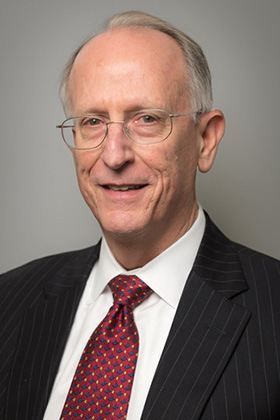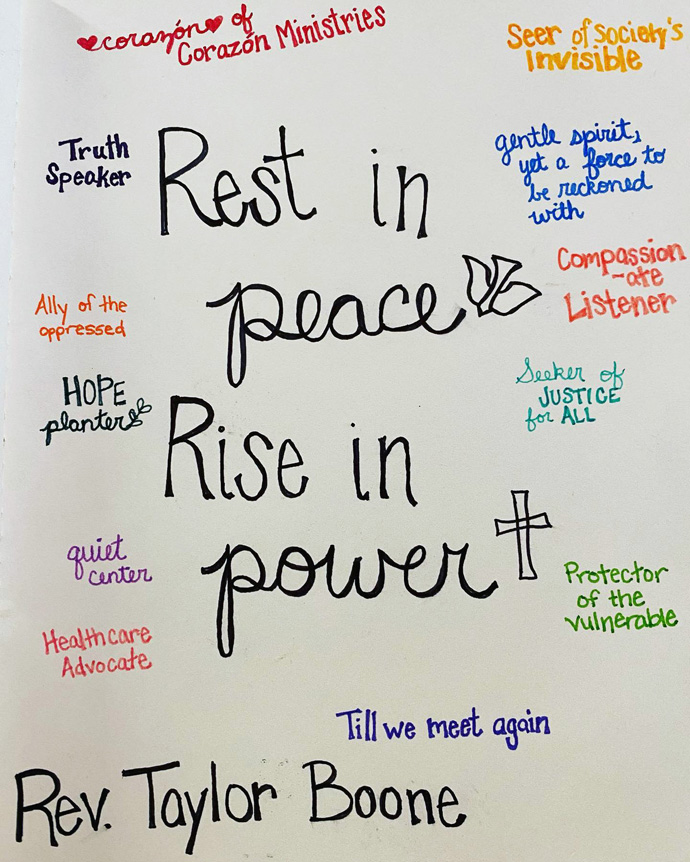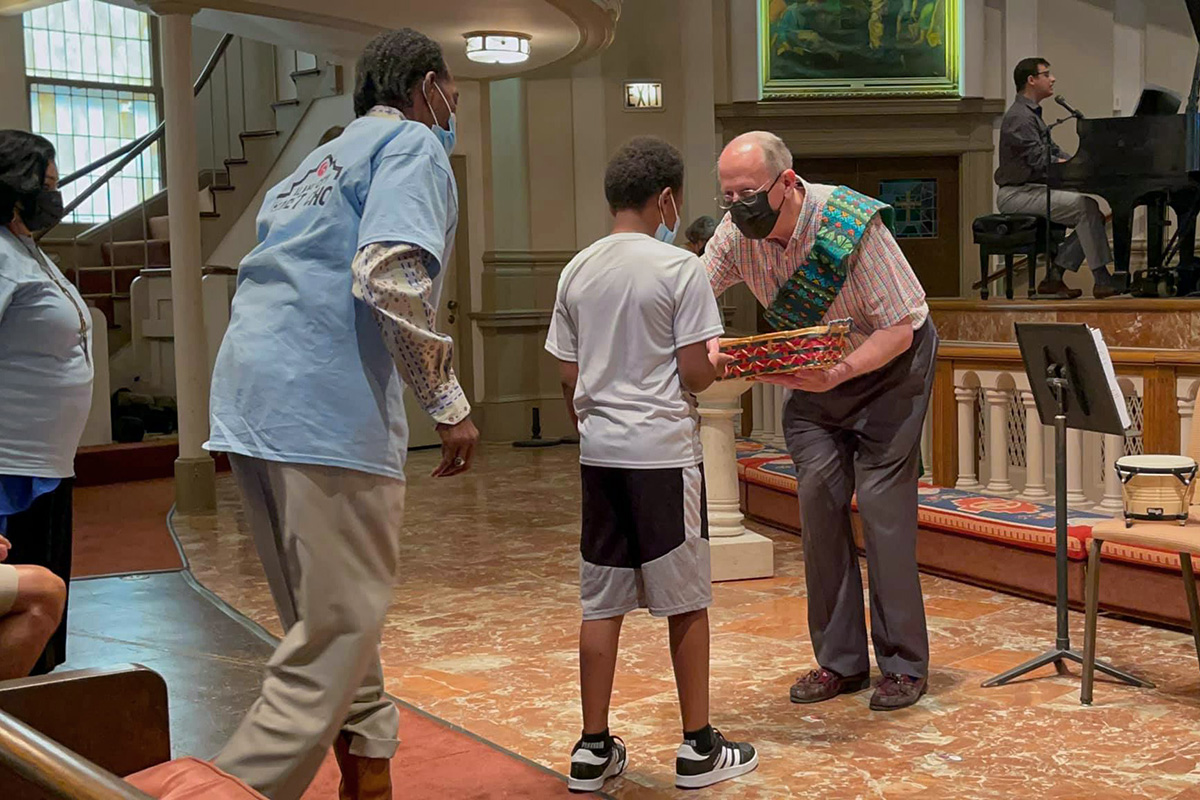Key points:
• The Rev. Taylor Boone was both a lawyer and a United Methodist minister in San Antonio.
• As a lawyer, he had the key role in bringing about a hospital partnership that greatly expanded United Methodist-affiliated health care across San Antonio and South Texas.
• - Boone entered seminary and became an ordained deacon in late middle age, working in homeless ministry even as he handled the estates of wealthy clients.
The name “Taylor Boone” sounds like a law firm, and the Rev. Taylor Boone was indeed a highly regarded San Antonio attorney for decades.
But well into his 50s, he answered a call to ministry. He enrolled in seminary, became an ordained United Methodist deacon and served as a part-time associate pastor focused on homeless ministries — all while continuing to handle the legal work of well-heeled clients.
Earlier in his career, Boone chaired a local Methodist hospital board and took the lead in creating a partnership that would greatly expand Methodist-affiliated health care across South Texas, including for the underserved.
Rio Texas Conference Bishop Robert Schnase said that as he drives around his episcopal area, he sees the United Methodist Cross and Flame in hospitals, clinics and other health care settings, all governed according to United Methodist Social Principles. He thinks of the lawyer-minister who made that happen — and who faithfully served San Antonio’s homeless.

“It’s hard to imagine anyone who has had more impact on Methodism and the Methodist purposes than Taylor Boone,” Schnase said. “The fruit has been incredible.”
Boone died Sept. 15, at age 72. Family members said he had been hospitalized for urgent surgeries that led to a compromised immune system. Despite being fully vaccinated, he tested positive for COVID-19 and died of complications from the virus.
Among the many United Methodists posting social media tributes to Boone was the Rev. Hilary Marchbanks, who had him as a spiritual director when she was preparing for ordination as an elder.
“He was a great man,” said Marchbanks, pastor of Saint John’s United Methodist Church in Austin, Texas. “I’m sad to be in a world without his ministry.”
In the early 1990s, the Houston-born Boone was an experienced estate-planning lawyer and CPA, active at San Antonio’s Laurel Heights United Methodist Church in San Antonio, and serving as board president of Southwest Texas Methodist Hospital.
The hospital needed to change for two reasons, Boone told the San Antonio Business Journal in a 2003 retrospective interview.
“One was that, as a stand-alone tertiary care hospital system, we knew we’d be in serious financial trouble,” Boone said. “The second was that we were not doing enough to take care of people who were being marginalized.”
Boone and other leaders explored options, finally deciding that forming a partnership with a for-profit hospital company, the one now known as HCA Healthcare, was best.
The highly unusual deal Boone and the board worked out included creation of a new nonprofit, Methodist Healthcare Ministries of South Texas, that would have 50-50 ownership with HCA of Methodist Healthcare System. The system itself would be new, consisting of Southwest Texas Methodist Hospital as flagship and local hospitals already owned by HCA.
Half the profits from the hospital system would go to Methodist Healthcare Ministries for direct care to low-income and uninsured people. All the hospitals would have robust chaplaincy programs, and all would display the Cross and Flame and the motto “Serving Humanity to Honor God.”
Bill Balthrope was on the board with Boone, and he said Boone essentially put his law practice on hold to work on the partnership and to deal with pushback about a nonprofit hospital teaming with a corporation. Boone had to answer tough questions from physicians, the local daily newspaper and the Southwest Texas Conference (now Rio Texas).
“Taylor did a magnificent presentation to the conference on why this was a good thing and why the church should support it,” Balthrope said.
The current president/CEOs of Methodist Healthcare System and Methodist Healthcare Ministries, Allen Harrison and Jaime Wesolowski, offered their own assessment of Boone’s role in a joint statement after his death.
“By all accounts, he was the chief architect of the partnership — the founding father of the Methodist Healthcare family in South Texas,” they said. “It took the very highest level of understanding, skill, compassion and faith to bring all the constituencies together.”
Methodist Healthcare System has become the region’s largest health care provider, with nine hospitals, 29 facilities in all, 12,000 employees and more than 2,700 physicians.
Meanwhile, Methodist Healthcare Ministries has become the region’s largest private funding source of community health care. It operates two primary care clinics, a Wesley Nurse program that has registered nurses in scores of Rio Texas Conference churches, an extensive mental health counseling service and a grants program that supports other nonprofits providing care.
“It’s been a phenomenal success,” Alice Gannon, current board chair of Methodist Healthcare System, said of the partnership. “Taylor was more responsible than any other single person.”

In 2000, Boone and his wife, Alison, became part of Travis Park (United Methodist) Church, drawn by its fledgling homeless ministry. The downtown church was serving a free Sunday breakfast to people living on the streets.
What started as Cafe Corazon would expand into Corazon Ministries, offering a range of services, including a laundry, hot showers, haircuts, medical treatment and art therapy. But things were basic in the early days, and Boone found a way to meet a need.
“The story of Jesus washing the feet of the disciples really tugged at him, and he began the bathroom ministry,” Alison Boone said.
She explained that some church members were unhappy at the state of the bathrooms after the homeless had used them, so “Taylor kept the bathrooms clean, and he would sit at the door and hand out toiletries.”
She added that her husband had long felt a call to ordained ministry, and volunteering in a homeless ministry strengthened it. In 2002, he began a six-year journey toward a seminary degree and ordination as a deacon — the United Methodist clergy order dedicated to ministries of compassion and justice.
He continued to practice law, but fit in Perkins School of Theology extension classes in San Antonio and Houston, as well as taking early morning flights to Dallas for classes on the main campus at Southern Methodist University. He even spent one term in residence.
“I called him one Friday night, and he said he couldn’t talk long. He had a dorm meeting,” she said.
Taylor Boone, the 50-something downtown lawyer with a portfolio of wealthy clients, made an impression on fellow seminarians. One was the Rev. Sayunda Casey, a pastor in the African Methodist Episcopal (AME) Church.
Casey said she came from a conservative religious and social background in Selma, Alabama, and that Boone, over lunches, helped her become open to LGBTQ inclusion in the church. He even helped her get a handle on the Black liberation theology of James H. Cone.
“Taylor in his whiteness understood Cone, and I didn’t,” Casey said. “He was a white man who was woke before woke was popular.”
Boone earned his master of divinity from Perkins in 2008 and served as a Rio Texas Conference deacon from 2008 to 2017, when he retired from formal ministry. From 2005 to 2008, he oversaw Corazon Ministries, and from 2008 to 2016, he was a minister for outreach and associate pastor at Travis Park Church.
But his day job was still practicing law, with weekends and some weeknights spent working with the homeless.
“He never took a salary from Travis Park,” Alison Boone said.
That didn’t hinder his commitment.
“Taylor’s heart for the homeless made him an invaluable asset to Corazon Ministries,” said the Rev. Monte Marshall, former pastor at Travis Park. “He made people feel welcomed and at home. He was a trusted friend to many folks desperate for positive relationships. He was a tireless advocate for justice. His wisdom strengthened the ministry immeasurably.”
Boone preached as recently as July 11 at Travis Park, in an anniversary service for Corazon Ministries.
Alison Boone said her husband came to understand his role as that of a bridge between those with wealth and privilege and those in great need.
He kept the bridge level, she said.
“He truly believed that we’re all God’s children and all equal in God’s eyes.”
In addition to his wife, Boone is survived by their daughters, Virginia Hewlett and Catherine de Marigny, and four grandchildren.
A memorial service is set for Oct. 2 at 3:30 p.m. at Travis Park Church. The family requests that memorial gifts go to either Clarity Child Guidance Center, Corazon Ministries, Planned Parenthood South Texas or a nonprofit of the donor’s choice.
Hodges is a Dallas-based writer for United Methodist News. Contact him at 615-742-5470 or newsdesk@umcom.org. To read more United Methodist news, subscribe to the free Daily or Weekly Digests
Like what you're reading? Support the ministry of UM News! Your support ensures the latest denominational news, dynamic stories and informative articles will continue to connect our global community. Make a tax-deductible donation at ResourceUMC.org/GiveUMCom.




